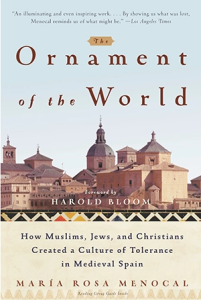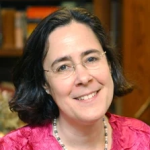The Ornament of the World: How Muslims, Jews, and Christians Created a Culture of Tolerance in Medieval Spain

Author: María Rosa Menocal
Publisher: Back Bay Books
Year of Publication: 2003
Print Length: 315 pages
Genre: Non-Fiction / History, Geography, Social Science
Area: South Europe, Spain, Andalusia, Avila, Cordoba, Granada, Huesca, Seville, Toledo, Italy, Sicily, France, Paris, Cluny
Topic: Muslim, Jews, Christian, Islam, Christianity, Judaism, Tolerance, Solidarity, Cultural Heritage/Legacy, Culture & Society, History, Identity, Reconciliation, Community, City & Urban, Civilization, Lived Experience, The Muslim World, Islamophobia
This enthralling history, widely hailed as a revelation of a “lost” golden age, brings to vivid life the rich and thriving culture of medieval Spain, where for more than seven centuries Muslims, Jews, and Christians lived together in an atmosphere of tolerance, and where literature, science, and the arts flourished.
“It is no exaggeration to say that what we presumptuously call ‘Western’ culture is owed in large measure to the Andalusian enlightenment… This book partly restores a world we have lost.” —Christopher Hitchens, The Nation
“This classic bestseller — the inspiration for the PBS series — is an “illuminating and even inspiring” portrait of medieval Spain that explores the golden age when Muslims, Jews, and Christians lived together in an atmosphere of tolerance.” —Los Angeles Times
Table of Contents
List of Maps
Foreword by Harold Bloom
A Note on Transliterations and Non-English Names
Beginnings
A Brief History of A First-Rate Places
The Palaces of Memory
The Mosque and the Palm Tree – Cordoba, 786
Mother Tongues – Cordoba, 855
A Grand Vizier, A Grand City – Cordoba, 949
The Gardens of Memory – Madinat al-Zahra, South of Cordoba, 1009
Victorious in Exile – The Battlefield at Argona, Between Cordoba and Granada, 1041
Love and Its Songs – Niebla, Just West of Seville, on the Road to Huelva, August, 1064 / Barbastro, in the Foothills of the Pyrenees, on the Road to Saragossa, August 1064
The Church at the Top of the Hill – Taledo, 1085
An Andalusian in London – Huesca, 1106
Sailing Away, Riding Away – Alexandria, 1140
The Abbot and the Quran – Cluny, 1142
Gifts – Sicily, 1236 / Cordoba, 1236 / Granada, 1236
Banned in Paris – Paris, 1277
Visions of Other Worlds – Avila, 1305
Foreign Dignitaries at the Courts of Castile – Seville, 1364 / Toledo, 1364
In the Alhambra – Granada, 1492
Somewhere in La Mancha – 1605
Epilogue: Andalusian Shards
Postscript
Other Readings
Thanks
Index

María Rosa Menocal is is a scholar of medieval culture and history. She received her BA, MA, and PhD in Romance philology from the University of Pennsylvania and taught at Bryn Mawr College and Penn before joining the Yale faculty in 1986, where she is Sterling Professor of the Humanities and Director of the Whitney Humanities Center. She has written extensively on the intellectual and cultural history of the Middle Ages, and is the author of The Arabic Role in Medieval Literary History: A Forgotten Heritage; Writing in Dante’s Cult of Truth: From Borges to Boccaccio; Shards of Love: Exile and the Origins of the Lyric; and The Ornament of the World.
Source: https://mariarosamenocal.com/
More from María Rosa Menocal in this library, click here.
